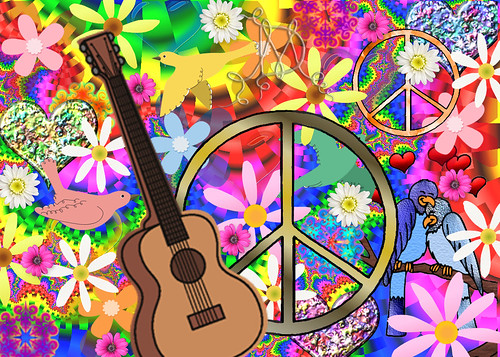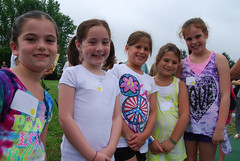 When I think about “camp songs,” I immediately think about singing around campfires, but each year at camp also has a distinct popular music soundtrack. Recently, campers weighed in on Twitter about the tunes that remind them of past summers and that got me thinking about what the United States and camp was like in the 1960s and 1970s.
When I think about “camp songs,” I immediately think about singing around campfires, but each year at camp also has a distinct popular music soundtrack. Recently, campers weighed in on Twitter about the tunes that remind them of past summers and that got me thinking about what the United States and camp was like in the 1960s and 1970s.
Hadley Hury remembers You’re A Good Man Charlie Brown (1969) and Music Man and the Counselors’ Show from 1970. That’s also when Charlie Ziff was theatre director, Hadley was assistant director and Jay Newman had the job of radio director for The Fantastiks. 1969 was the year that campers watched the moonwalk on television in the theatre and there was lots of talk about some “big thing going on in some little town called Woodstock!”
Bobby Brickman says he has vivid memories that revolve around people who played lead roles in productions of Brigadoon in 1961, Carousel in 1963, and Bye Bye Birdie in 1963. It’s clear that for a very long time, camp has been the place to put creativity and passion into great performances!
Barbara Gough adds that when she hears the captivating bass line of “Reach Out of the Darkness” by Friend and Lover, she’s immediately transported back to 1968. Friend and Lover was a one hit wonder and their song ranked in the Top Ten during 1968 when Barbara says campers “danced to this playing on the jukebox in the Canteen all summer long!” The song embraced social change with lyrics like “I think it’s so groovy now, That people are finally getting together. . .Reach out in the darkness. . .And you may find a friend.”

Back then, while campers made friends and memories, things in the United States as a whole were not so peaceful. When students in California held a Selective Service sit-in, 3,000 of them were arrested and housed in the San Francisco 49ers’ old football stadium. A promo man got a sound truck and started broadcasting “Reach Out of the Darkness” towards the students. That’s what started the song’s rise up the charts—and why campers miles away listened to the hit that summer!
The historical events of those times grounded the more multicultural and open society we have today, but during the 1960s, many people felt uncertain as to what the future held. In 1968, when Martin Luther King Jr. was assassinated, “Reach Out in the Darkness,” rocketed up the charts and like other big hits that year, captured the country’s changing mood. Songs that also ranked in 1968 include the Rascals’, “People Got to Be Free,” Simon & Garfunkel’s “Mrs. Robinson,” The Beatles’ “Hey Jude,” James Brown’s “Say It Loud–I’m Black and I’m Proud,” and versions of “I Heard It Through the Grapevine” by Gladys Knight and the Pips and Marvin Gaye.

Summer camp is always a microcosm of our world-at-large where campers practice and learn skills for negotiating the world, where assumptions can be challenged, and where diverse people find ways to celebrate community and appreciate each other. One great thing about camp is that for a few weeks, the world grows a little smaller and everyone listens to the same soundtrack. In a fast-paced and interconnected world, camp “sounds” like the perfect place for connecting with others and as Hadley says, every summer adds up to “good times for campers and staff.” It’s often only later that campers realize how much the experience has shaped them and the way they see the world–much like how hit songs can illuminate the past in retrospect. The music (and fashions) may change through the years, but the core camp experience is never goes out of date.
We’d love to hear about how your time at camp contributed to your understanding about others as well as what you’re looking forward to most this summer!
Thanks for the image Cre8iveDoodles ~*~ New Beginnings!

